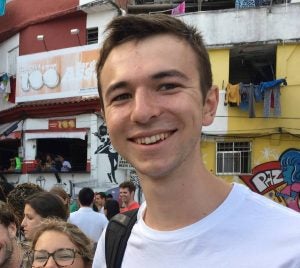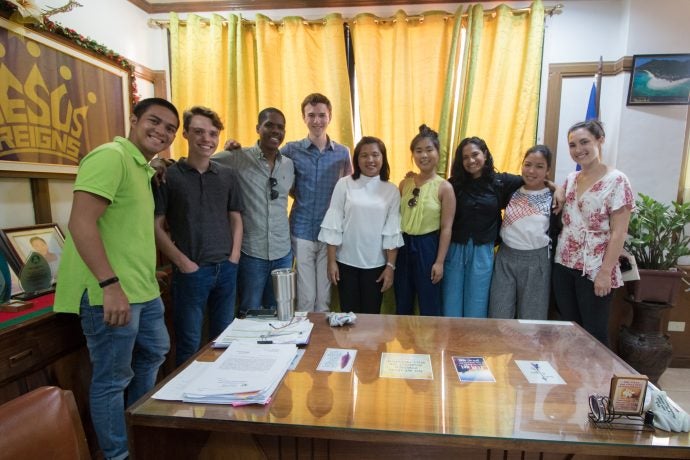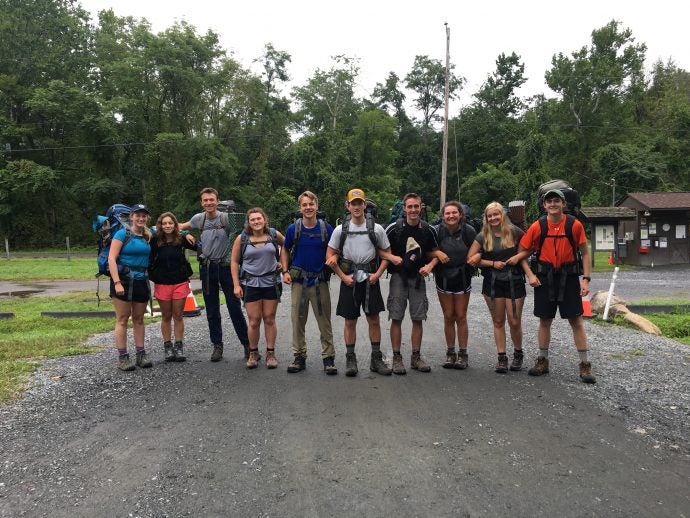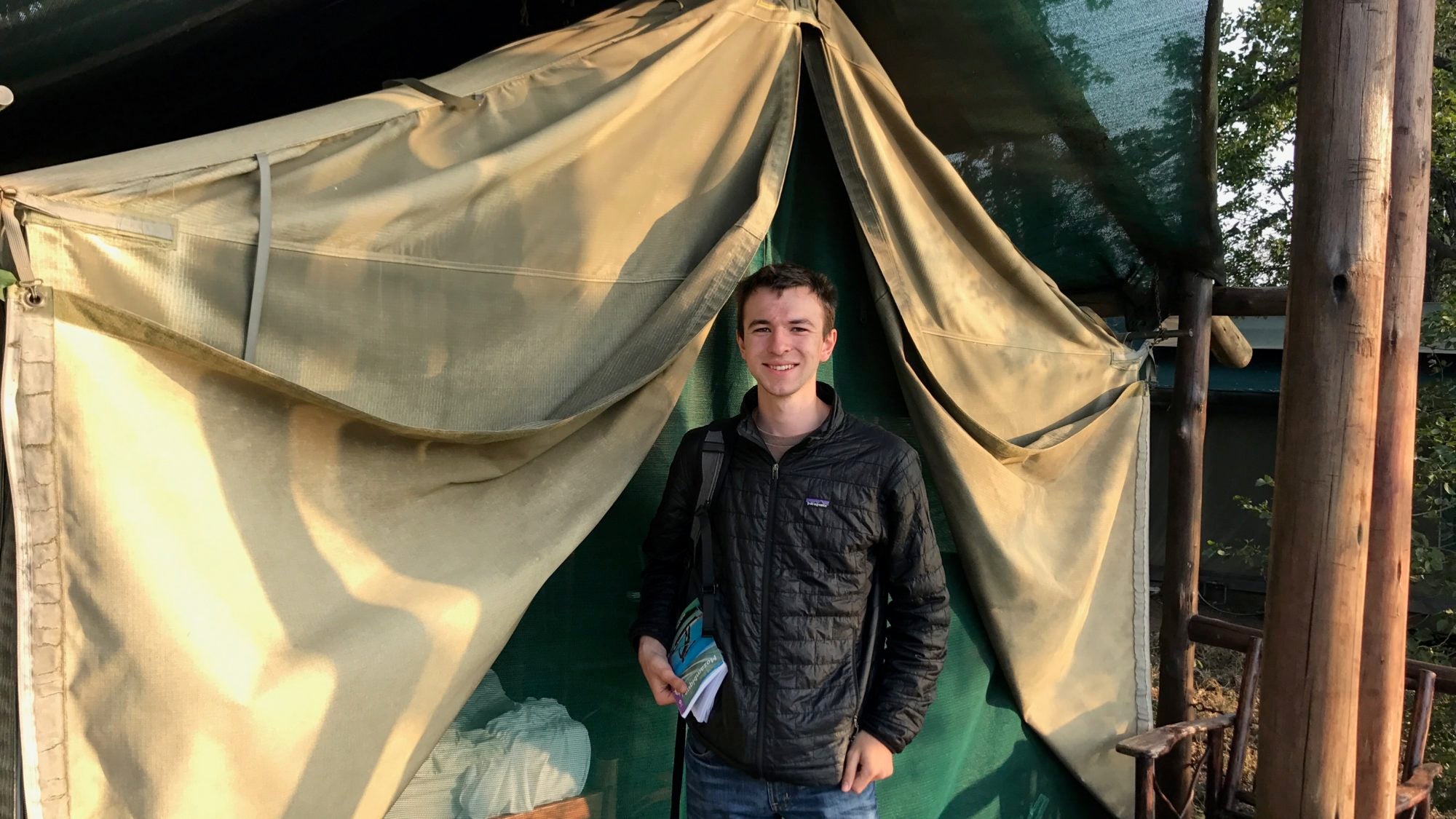Choosing Georgetown
One of the major reasons that Loft chose Georgetown was the passion he sensed from the students from the day he toured campus.

“It’s a cliché that every Georgetown student wants to change the world, but I think that cliché makes campus life fascinating,” Loft explains. “Every Georgetown student has an issue he or she is passionate about, whether it’s reforming the judiciary, expanding global healthcare access, or finding ways to combat extremism. That makes Georgetown an exciting place to learn.”
Following his own passions, Loft’s focus within STIA is energy and the environment, which has allowed him to study the relationship between international politics and environmental conservation.
“To really understand biodiversity, and the current extinction crisis, we cannot just examine the natural processes that drive speciation and extinction,” Loft says. “We have to also understand how people interact with the environment, and how international political systems shape those interactions.”
With STIA, Loft has been able to gain a strong background in biology while situating this scientific study in the framework of global politics. On the biology side, professors Jennifer Fox and Manus Patten have had a significant impact on him, fostering his passion for conservation and helping him share it with others.
“They’ve helped me appreciate the relationship between understanding and excitement,” Loft says. “I’ve learned that the best way to get a student excited about conservation is to get him or her to understand how dynamic and beautiful the natural world is, something I try to apply to my work as a teaching assistant for Foundations of Biology II and for Ecology.”
However, Loft’s most influential class is quite far from the biology department: Introduction to Greek Literature class with Professor Charles McNelis. Loft says this class changed the way he reads, making him constantly draw connections between the classics he read for that class and everything else he reads.
“Just about every book in Western literature has roots in Greek literature,” Loft says. “Having that sense of context and continuity makes my reading life far richer.”

Field Work in Mozambique

Through his interdisciplinary major, Loft has been able to observe the relationship between conservation and war, which he says are “linked cyclically.” Loft believes that national parks have the potential to break this cycle, by conserving biodiversity and creating better opportunities for the people living around them.
“War-damaged ecosystems are less able to provide resources like freshwater and fertile soil,” Loft explains. “People dependent on those resources become more desperate and likely to turn to war, beginning the cycle anew.”
For his thesis, Loft focused on national parks in post-civil war Mozambique. He first studied the Mozambican civil war in his Portuguese classes with Professor Sandra Pires. Loft noticed that while many of Mozambique’s neighbors, such as South Africa and Tanzania, have multibillion dollar ecotourism industries, that was not the case in Mozambique.
“I realized that the Mozambican civil war had wiped out Mozambique’s ecotourism industry, and that even twenty-five years after its conclusion, Mozambique had not yet been able to rebuild their system of parks,” Loft says.
So Loft went to Mozambique himself to study the state of their national parks. He describes his experience in Mozambique as “absurdly challenging and very, very rewarding.” He arrived in in the country with just one planned interview, obtaining others by walking into ranger stations and cold-calling wardens in Portuguese. He ended up conducting 35. He recalls having to learn to drive stick shift—on the left side of the road—and traveling to some of the most remote parks in the country.
But it was worth it. One of the country’s most storied conservationists, now a high-ranking official in Mozambique’s state conservation agency, told him that nobody had yet compared the recoveries of the parks in which Loft did research. “My research was something he could use,” Loft says.

Exploring the outdoors—in D.C. and beyond

Loft also worked abroad as a Beeck Center impact fellow with El Nido Resorts in the Philippines. There he helped the local government build a communication platform to disseminate information about the local national park, the El Nido-Taytay Managed Resource Protected Area.
“Clear communication is crucial for good conservation management, because it allows governments to respond to community feedback and shape park management so that it benefits the people around the park,” Loft says.
As part of the impact fellowship, Loft was paired up with three undergrad Filipino students from Ateneo University and the University of the Philippines.
“I learned a ton from my Filipino coworkers about Filipino culture and was confronted with new ways to think about conservation, something that helped me grow as a student, as a conservationist, and as a member of the global community,” Loft says.
Back on campus, Loft is a TA for Ecology and Foundations of Biology, as well as a guide for Outdoor Education and a member of the Georgetown Climbing team.
“I spend a lot of time thinking about how to strengthen the outdoors community at Georgetown,” Loft says. “To that end, I lead Georgetown students on outdoor education hiking and climbing trips, and am an active member of the rock climbing team.”

His favorite spot on campus is probably unfamiliar to most students: the greenhouse on top of Reiss.
“I worked in Professor Ries’s lab one semester, and spent a lot of time raising plants for butterflies in the greenhouse on Reiss roof,” Loft explains. “As a rock-climber, I’m always looking for a good view. And I’m convinced the view from Reiss roof is the best on campus.”
His favorite Georgetown memory comes from his time as a leader for the Georgetown Outdoor Pre-Orientation Program (GOPOP) this summer.
“I met my closest friends on my own GOPOP as a freshman, and feel lucky to pay that debt forward, by easing some of this year’s incoming students’ transition to the hilltop,” Loft says. “Sitting on a rock overlooking Shenandoah Valley, watching peregrine falcons wheel through the sky and listening to my freshman laugh and bond in their first days at Georgetown, is something I’ll never forget.”
Looking Ahead
While Loft is not exactly sure what his next step will be, his goal is to continue working in post-conflict conservation. He is interested in working for an NGO that supports conservation projects in Africa, or he might go to Africa himself to work on conservation efforts on the ground. Angola, another Portuguese-speaking country, is particularly on his radar.
“Like Mozambique, Angola’s parks were wiped out by war. And like Mozambique, it is beginning the process of rebuilding its national park system,” Loft says. “I’d love to play a part in that reconstruction process.”
To other students interested in conservation, Loft would advise them to be willing to get their hands dirty.
“You have to take risks to get things done on conservation, because the most meaningful work happens in the field, not in the office,” Loft says. “So go out and make things happen.”
He also urges students to take advantage of their studies in the SFS, which provide “a rare global liberal arts education,” and allows them to think about environmental challenges and solutions through the lens of global politics.
“The SFS has taught me to think globally,” Loft says. “I want to pursue a career in international conservation to help close the global inequality gap, and to make sure that everyone has access to the same environmental resources I had access to growing up in California.”
